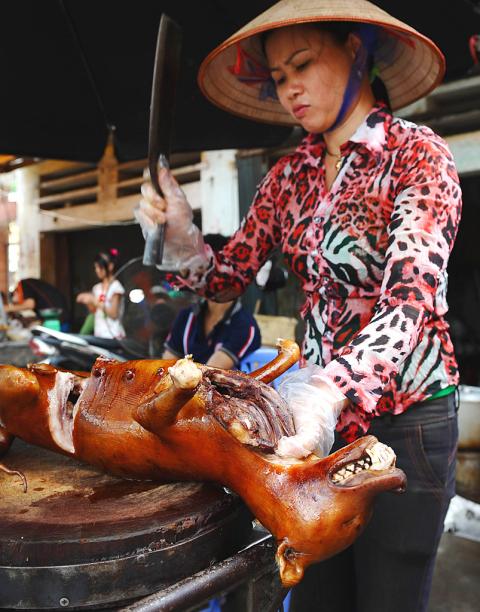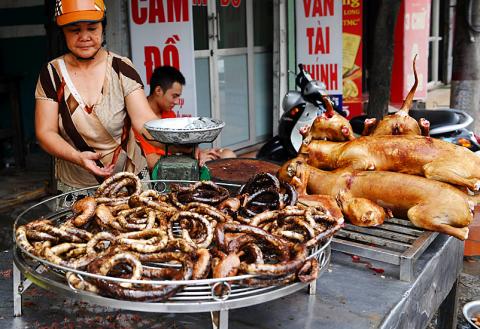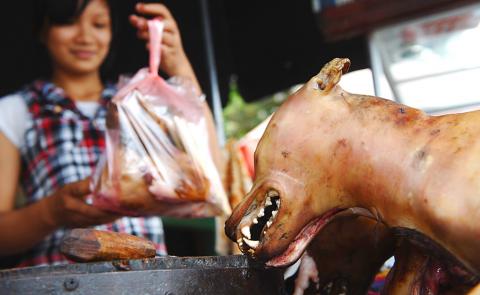At a packed Hanoi restaurant, one of Vietnam’s growing ranks of proud pooch owners tucks into a traditional delicacy to mark the end of the lunar month — a plate of juicy dog.
Canine meat has long been on the menu in Vietnam. But now a growing love of the four-legged friends means that one man’s pet can be another’s dog sausage — quite literally as far as dog bandits are concerned.
“We never kill our own dogs for their meat. Here I’m eating in a restaurant so I don’t care which dogs they killed or how,” Pham Dang Tien, 53, said as he chewed contentedly on a plate of boiled dog.

Photo: AFP
Dog meat is good for health and virility, believes Tien, who sees no contradiction between these monthly meat binges and owning a dog — his family have had a string of beloved pet pooches over the course of 20 years.
For many older Vietnamese, dogs are an essential part of traditional Vietnamese cuisine that can coexist with pet ownership. Those dogs that end up on the dinner table are traditionally beaten to death.
When times were hard after the Vietnam War, local authorities in big cities strictly limited pet ownership.

Photo: AFP
But as the popularity of keeping animals at home rises along with the economy and living standards, more young people feel like 16-year-old Nguyen Anh Hong.
“I just don’t understand how people can eat dogs — they are lovely pets,” she said.
The love affair has a dark side — growing ranks of thieves go from small town to small town in rural areas of Vietnam stealing pets to sell to dog meat restaurants.

Photo: AFP
Although the value of the thefts — dog meat fetches around six dollars per kilo — is too low to concern the Vietnamese police, the loss of a treasured pet to the cooking pot means emotions run high.
Dog-theft related mob violence has spiraled over the last few years.
In June, a man was beaten to death after hundreds of villagers caught him red-handed trying to steal a family dog in Nghe An province, the VNExpress news site reported, triggering an outpouring of public support for the mob.
“It’s not right to beat a man to death but anyone in this situation would do the same,” one reader, who lost a pet to the bandits, wrote on the site.
From food to fashion
In Hanoi’s Reunification Park, hundreds of people now walk their pet dogs every day, showcasing the range of exotic foreign breeds — Chihuahuas and Huskies are particularly popular — favored by Hanoi-based pet-owners.
“In Vietnam now, raising pet dogs has become fashionable,” said Cu Anh Tu, a 20-year-old university student and dog owner.
“The young generation now seems to love animals very much,” he added.
In the countryside, local mongrels are kept as pets or guard dogs. It is these, more nondescript, animals which are most vulnerable to the dog bandits.
Most of the dogs served in Hoang Giang’s restaurant are local breeds raised specifically to be eaten — but as local dogs are also kept as pets in the countryside, it is hard to know which animals are stolen, and which are farmed.
While exotic pet dogs are found only in cities, “in the countryside people will continue to see dogs as meat,” he said.
Typically, Vietnamese “eat dog meat at the end of the lunar month to get rid of bad luck. That’s what business people often do,” said 30-year-old Giang, a specialist dog meat chef.
As he prepared a plate of canine meat in the kitchen of his busy restaurant, Giang told AFP that his small establishment served up to seven dogs a day at that time of the month — and business is reliably solid.
Dog is served in a range of ways — from boiled to barbecued — often with shrimp sauce, rice noodles and fresh herbs, he said.
Towards a ‘pet loving’ culture
For Nguyen Bao Sinh, a luxury kennel owner in Hanoi, Vietnam needs to move away from its traditional love of canine meat and learn from other pet-loving cultures.
“They (Westerners) love dogs in this life. That viewpoint is very good ... We should love dogs here and now in this life. We should not kill them or beat them barbarously,” he said.
Sinh, who run’s Hanoi’s only luxury kennel and grooming parlour for pets, said he has seen a rise in the number of pet-mad Vietnamese.
His establishment offers “hotel rooms” for pets whose owners go away on business or holidays — and even has a cemetery for dogs and cats, where hundreds of pets are buried, and monks perform blessings every year.
“It would be better if the state had a law banning the eating of dog meat,” Sinh said.
“However, we should not discriminate or look down upon those eating dog meat,” he told AFP, adding that the key was to gradually convince the public to respect and love animals.

May 26 to June 1 When the Qing Dynasty first took control over many parts of Taiwan in 1684, it roughly continued the Kingdom of Tungning’s administrative borders (see below), setting up one prefecture and three counties. The actual area of control covered today’s Chiayi, Tainan and Kaohsiung. The administrative center was in Taiwan Prefecture, in today’s Tainan. But as Han settlement expanded and due to rebellions and other international incidents, the administrative units became more complex. By the time Taiwan became a province of the Qing in 1887, there were three prefectures, eleven counties, three subprefectures and one directly-administered prefecture, with

Taiwan Power Co (Taipower, 台電) and the New Taipei City Government in May last year agreed to allow the activation of a spent fuel storage facility for the Jinshan Nuclear Power Plant in Shihmen District (石門). The deal ended eleven years of legal wrangling. According to the Taipower announcement, the city government engaged in repeated delays, failing to approve water and soil conservation plans. Taipower said at the time that plans for another dry storage facility for the Guosheng Nuclear Power Plant in New Taipei City’s Wanli District (萬里) remained stuck in legal limbo. Later that year an agreement was reached

What does the Taiwan People’s Party (TPP) in the Huang Kuo-chang (黃國昌) era stand for? What sets it apart from their allies, the Chinese Nationalist Party (KMT)? With some shifts in tone and emphasis, the KMT’s stances have not changed significantly since the late 2000s and the era of former president Ma Ying-jeou (馬英九). The Democratic Progressive Party’s (DPP) current platform formed in the mid-2010s under the guidance of Tsai Ing-wen (蔡英文), and current President William Lai (賴清德) campaigned on continuity. Though their ideological stances may be a bit stale, they have the advantage of being broadly understood by the voters.

In a high-rise office building in Taipei’s government district, the primary agency for maintaining links to Thailand’s 108 Yunnan villages — which are home to a population of around 200,000 descendants of the Chinese Nationalist Party (KMT) armies stranded in Thailand following the Chinese Civil War — is the Overseas Community Affairs Council (OCAC). Established in China in 1926, the OCAC was born of a mandate to support Chinese education, culture and economic development in far flung Chinese diaspora communities, which, especially in southeast Asia, had underwritten the military insurgencies against the Qing Dynasty that led to the founding of